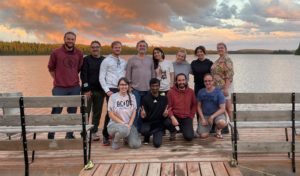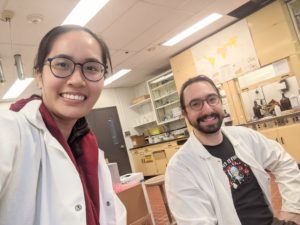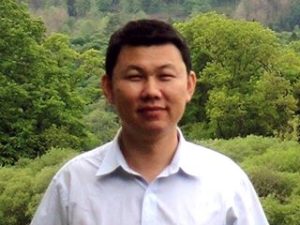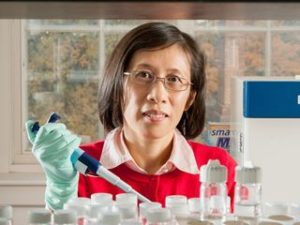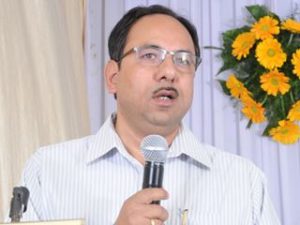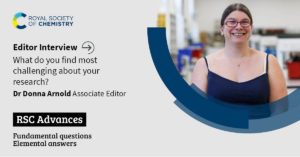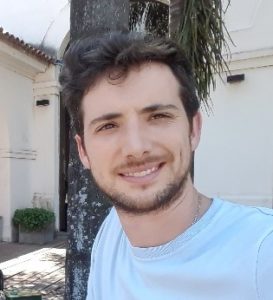Laura Fisher is Executive Editor for RSC Advances at the Royal Society of Chemistry. She is responsible for the strategic development of the journal, working with members of the Editorial Board and Associate Editors to ensure RSC Advances upholds its standards of quality and impact, and supports the global chemistry community. She kindly agreed to talk about her career in publishing and her aspirations for RSC Advances in the future.

You started as Managing Editor for RSC Advances in June 2019 and in January this year, you were appointed as Executive Editor. Going forward, what is your vision for the journal? What can authors and readers expect of RSC Advances in the future?
I’ve really enjoyed working with the RSC Advances team for the past year. My previous role was across five journals, all of which were much smaller and more subject-specific, as well as not being open access. RSC Advances offers completely different challenges in terms of the size of the journal and engaging with authors across a much broader subject range, and I have learned a lot in the past year! I have really enjoyed the Open Access focus, and working with our huge team of Associate Editors who cover so many different subjects and geographies, but are all so engaged with what we are doing.
In the future I would like us to engage with more and more early career researchers, and give them opportunities to be involved in the journal, whether it is as web writers on our blog, as reviewers, or as Associate Editors. I’d also really like to engage with more people who are really passionate about open access publishing, as I really believe it is the future of our field.
Soon after you started as Executive Editor, the COVID-19 pandemic hit the world. How has this affected you and the journal? What has been most challenging?
From a personal standpoint the biggest transitions have been working from home rather than seeing my colleagues and teammates in the office every day, and also the lack of international travel. I was lucky to get out to China and meet some of the community there last November, but it has been really strange not getting to meet authors and readers in person at conferences over the past year.
From a journal point of view we saw a big spike in submissions at the start of lockdown, when I guess more people had time for writing, and more recently a slight dip as labs are opening up and people are focussing on getting their research back on track. We are also seeing funding being limited in certain regions, which can be challenging for open access.
I also think there have been some positives though, such as the way we have learned to communicate with each other remotely through various means, and that could have a really big benefit going forwards both in terms of collaboration, but also in limiting the amount of international travel for conferences, which is a big part of both my role as an Executive Editor, as well as those of our authors, editors, and readers.
It is the International Open Access Week and you are leading one of the largest gold open access chemistry journals in the world. What makes RSC Advances an important journal in the work towards open research?
The main thing for me is that we are really trying to make open access publishing as inclusive as possible. Our APCs are some of the lowest in the industry, and we offer waivers and discounts to authors from developing countries. To me that shows that we really are doing this for the researchers, and to make chemical science more accessible for everyone.
What would you say to researchers who are on the fence about open access?
It really depends on their reasoning. For those who have concerns about whether the research is reliable and of high quality, I would highlight the fact that at RSC Advances our standards have not changed since before we were open access. Our reject rate has been steady at ~55% for the past 7 years, and this shows that we are applying the same quality standards to open access work as we were previously.
It is also important to clarify that at the RSC we keep our editorial decisions very separate from any decisions about discounts or waivers. We do that for a good reason – so that we are only judging people’s research on the research itself, and not on the author’s ability to pay an APC. That is the way it should always be.
Finally I would tell people that one of the main benefits of open access is that your research can be read by more people. Under the subscription model only people at institutions with subscription access, or those who pay per article, can read articles, whereas with Open Access anyone can read your work. That includes people at institutions with lower budgets, people in developing countries who don’t generally have broad access to research, and people working in different fields. This means more opportunities for citation and collaboration.
You have a background in research yourself, a PhD in chemistry. Please could you tell us about that?
I did my undergraduate degree and my PhD at the University of Bath. Technically my PhD is in chemical engineering, but it had a quite heavy chemistry focus – synthesising and characterising MOFs, and then measuring their hydrogen adsorption capacity for potential use in fuel cells. After leaving Bath I completed a postdoc at Stellenbosch University, South Africa. However, I have to say I was never a very good practical chemist, and my accident-prone nature made me realise that being in the lab probably wasn’t the best career path for me. I really wanted to stay involved in science though, which is why I applied to work at the Royal Society of Chemistry.
In the past, you have worked on several different journals as well as been involved in the launching of new journals. What made you interested in a career in publishing in the first place? What do you find most exciting with RSC Advances?
As I said in the previous question, it was mostly wanting to stay involved in science but recognising that a career in research didn’t really suit me. I also really enjoy writing, and initially was attracted to the language editing side of the role – helping authors improve their papers. As my career developed I realised I was better at the more outward-facing side of the editor role, and I really enjoy getting to work directly with members of the scientific community on a daily basis. The breadth of scope in RSC Advances makes that even better, because there are so many people who have published in, reviewed for, or read the journal, and each has a different insight.
What is the most common question people ask you about RSC Advances and what is your response to it?
I get a lot of questions from people who have been offered a transfer to RSC Advances from another RSC journal, asking why this is. The main reason is that we get a lot of really great work submitted to all of our journals at the RSC, but sometimes that work isn’t suitable for the journal it was submitted to, whether that is because it isn’t in scope, or because it doesn’t meet the novelty or impact standards of that journal. However, that doesn’t mean it isn’t great work, and we want to keep as much of that great work as we can at the RSC, by offering the authors the option to publish in a more suitable journal.
We see this as a service for authors, because the transfer is automatic once they approve it, so they don’t have to go through the submission process from the beginning again, and if their paper has already been through peer review, we can often use the same referees, or even the same referee reports, saving the authors time.
Sometimes a transfer offer will be made to one of our subscription journals, and sometimes it will be an open access journal, such as RSC Advances. The only criterion driving transfer offers is the suitability of the venue for the paper in question. And of course, these transfer offers are always optional!
Do you have any favourite RSC Advances articles? If so, which ones and why?
There was a paper earlier in the year where the authors had been inspired by the way beetles capture water from the air in deserts, and had used the same concept to design a surface that could capture water from fog, with the potential to generate drinking water in arid regions. I really do love how nature can inspire scientists in so many ways!
Back in 2016–2018 when I was working on the journal Soft Matter there was a series of papers in RSC Advances and Soft Matter where the authors were engineering edible microballoons that could be used to deliver nutritional supplements to babies in developing countries. The work they had published with us helped them secure a Bill & Melinda Gates Foundation grant. It’s really great when publications in our journals lead to work that can make such a difference in the world.
 Submit to RSC Advances today! Check out our author guidelines for information on our article types or find out more about the advantages of publishing in a Royal Society of Chemistry journal.
Submit to RSC Advances today! Check out our author guidelines for information on our article types or find out more about the advantages of publishing in a Royal Society of Chemistry journal.
Keep up to date with our latest HOT articles, Reviews, Collections & more by following us on Twitter. You can also keep informed by signing up to our E-Alerts.
 Submit to RSC Advances today! Check out our author guidelines for information on our article types or find out more about the advantages of publishing in a Royal Society of Chemistry journal.
Submit to RSC Advances today! Check out our author guidelines for information on our article types or find out more about the advantages of publishing in a Royal Society of Chemistry journal.













